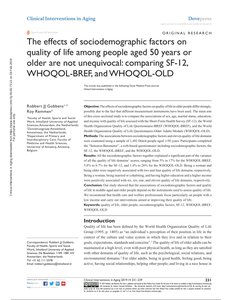Objective: The effects of sociodemographic factors on quality of life in older people differ strongly, possibly due to the fact that different measurement instruments have been used. The main aim of this cross-sectional study is to compare the associations of sex, age, marital status, education, and income with quality of life assessed with the Short-Form Health Survey (SF-12), the World Health Organization Quality of Life Questionnaire-BREF (WHOQOL-BREF), and the World Health Organization Quality of Life Questionnaire-Older Adults Module (WHOQOL-OLD). Methods: The associations between sociodemographic factors and eleven quality of life domains were examined using a sample of 1,492 Dutch people aged $50 years. Participants completed the “Senioren Barometer”, a web-based questionnaire including sociodemographic factors, the SF-12, the WHOQOL-BREF, and the WHOQOL-OLD. Results: All the sociodemographic factors together explained a significant part of the variance of all the quality of life domains’ scores, ranging from 5% to 17% for the WHOQOL-BREF, 5.8% to 6.7% for the SF-12, and 1.4% to 26% for the WHOQOL-OLD. Being a woman and being older were negatively associated with two and four quality of life domains, respectively. Being a woman, being married or cohabiting, and having higher education and a higher income were positively associated with six, six, one, and eleven quality of life domains, respectively. Conclusion: Our study showed that the associations of sociodemographic factors and quality of life in middle-aged and older people depend on the instruments used to assess quality of life. We recommend that health care and welfare professionals focus particularly on people with a low income and carry out interventions aimed at improving their quality of life.
DOCUMENT

Abstract Purpose To determine the predictive value of quality of life for mortality at the domain and item levels. Methods This longitudinal study was carried out in a sample of 479 Dutch people aged 75 years or older living independently, using a follow-up of 7 years. Participants completed a self-report questionnaire. Quality of life was assessed with the WHOQOL-BREF, including four domains: physical health, psychological, social relationships, and environment. The municipality of Roosendaal (a town in the Netherlands) indicated the dates of death of the individuals. Results Based on mean, all quality of life domains predicted mortality adjusted for gender, age, marital status, education, and income. The hazard ratios ranged from 0.811 (psychological) to 0.933 (social relationships). The areas under the curve (AUCs) of the four domains were 0.730 (physical health), 0.723 (psychological), 0.693 (social relationships), and 0.700 (environment). In all quality of life domains, at least one item predicted mortality (adjusted). Conclusion Our study showed that all four quality of life domains belonging to the WHOQOL-BREF predict mortality in a sample of Dutch community-dwelling older people using a follow-up period of 7 years. Two AUCs were above threshold (psychological, physical health). The findings offer health care and welfare professionals evidence for conducting interventions to reduce the risk of premature death.
DOCUMENT

Purpose To determine the predictive value of quality of life for mortality at the domain and item levels. Methods This longitudinal study was carried out in a sample of 479 Dutch people aged 75 years or older living independently, using a follow-up of 7 years. Participants completed a self-report questionnaire. Quality of life was assessed with the WHOQOL-BREF, including four domains: physical health, psychological, social relationships, and environment. The municipality of Roosendaal (a town in the Netherlands) indicated the dates of death of the individuals. Results Based on mean, all quality of life domains predicted mortality adjusted for gender, age, marital status, education, and income. The hazard ratios ranged from 0.811 (psychological) to 0.933 (social relationships). The areas under the curve (AUCs) of the four domains were 0.730 (physical health), 0.723 (psychological), 0.693 (social relationships), and 0.700 (environment). In all quality of life domains, at least one item predicted mortality (adjusted). Conclusion Our study showed that all four quality of life domains belonging to the WHOQOL-BREF predict mortality in a sample of Dutch community-dwelling older people using a follow-up period of 7 years. Two AUCs were above threshold (psychological, physical health). The findings offer health care and welfare professionals evidence for conducting interventions to reduce the risk of premature death.
LINK